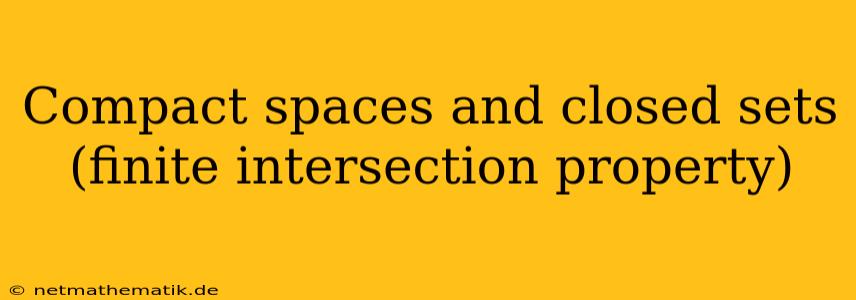In the realm of topology, the concept of compact spaces plays a crucial role, providing a powerful tool for understanding and analyzing continuous functions and their properties. A space is considered compact if every open cover of the space has a finite subcover. This seemingly abstract definition has profound implications, particularly when dealing with closed sets and their relationship to the finite intersection property. This article delves into the fascinating connection between compact spaces and closed sets, exploring the notion of the finite intersection property and its significance in establishing compactness.
The Finite Intersection Property
The finite intersection property (FIP) is a fundamental concept that underpins the connection between compact spaces and closed sets. It states that a collection of closed sets in a topological space possesses the FIP if and only if the intersection of any finite subcollection of the sets is non-empty. In other words, no matter how many closed sets you choose from the collection, their intersection will always contain at least one point.
H3: The Significance of FIP
The FIP serves as a bridge between closed sets and compact spaces, allowing us to characterize compactness using closed sets instead of open covers. This characterization proves particularly useful when dealing with spaces where open covers might be difficult to work with.
Connecting Compactness and FIP
A key theorem that establishes the link between compact spaces and the FIP is as follows:
Theorem: A topological space is compact if and only if every collection of closed sets with the finite intersection property has a non-empty intersection.
H3: Proof of the Theorem
To prove this theorem, we need to demonstrate that both directions hold.
Direction 1: If a space is compact, then every collection of closed sets with the FIP has a non-empty intersection.
- Assume that a space X is compact and consider a collection of closed sets {F<sub>i</sub>}<sub>i∈I</sub> in X that has the FIP.
- Since X is compact, every open cover of X has a finite subcover. This means that the complements of the closed sets, {X*F<sub>i</sub>}<sub>i∈I</sub>, cannot form an open cover of X.
- Therefore, there exists a point x in X that is not in any of the complements of the closed sets, implying that x belongs to every closed set in the collection.
- This shows that the intersection of all the closed sets in the collection is non-empty.
Direction 2: If every collection of closed sets with the FIP has a non-empty intersection, then the space is compact.
- Assume that every collection of closed sets with the FIP has a non-empty intersection, and let {U<sub>i</sub>}<sub>i∈I</sub> be an open cover of X.
- We need to show that this open cover has a finite subcover.
- Consider the complements of the open sets, {X*U<sub>i</sub>}<sub>i∈I</sub>. Since each U<sub>i</sub> is open, its complement X*U<sub>i</sub> is closed.
- Furthermore, the intersection of any finite subcollection of these closed sets is non-empty (otherwise, the corresponding union of open sets would form a finite subcover of X).
- Therefore, the collection of closed sets {X*U<sub>i</sub>}<sub>i∈I</sub> has the FIP.
- By our assumption, the intersection of all these closed sets is non-empty, implying that there exists a point x that is not in any of the open sets. This contradicts our initial assumption that {U<sub>i</sub>}<sub>i∈I</sub> is an open cover of X.
- Hence, any open cover of X must have a finite subcover, proving that X is compact.
Applications of the Finite Intersection Property
The connection between compact spaces and the FIP has far-reaching consequences in various areas of mathematics, including:
H3: Analysis
- Existence of Limits: The FIP can be used to prove the existence of limits in certain function spaces, such as spaces of continuous functions.
- Convergence of Sequences: The FIP plays a crucial role in establishing the convergence of sequences of points in compact spaces.
H3: Topology
- Compactness of Subspaces: The FIP helps demonstrate that closed subspaces of compact spaces are compact.
- Tychonoff's Theorem: This important theorem in topology uses the FIP to show that the product of any family of compact spaces is compact.
H3: Algebraic Topology
- Homotopy Theory: The FIP is essential in proving certain key results in homotopy theory, such as the homotopy extension property.
Conclusion
The finite intersection property provides a powerful tool for understanding and working with compact spaces, revealing their intricate relationship with closed sets. This fundamental concept serves as a bridge between open covers and closed sets, offering a more convenient way to characterize compactness in certain settings. The applications of FIP extend far beyond topology, impacting diverse areas of mathematics and illustrating its significance in establishing fundamental theorems and properties. Understanding the interplay between compact spaces, closed sets, and the FIP is crucial for anyone seeking to delve deeper into the elegant world of topology and its applications.
